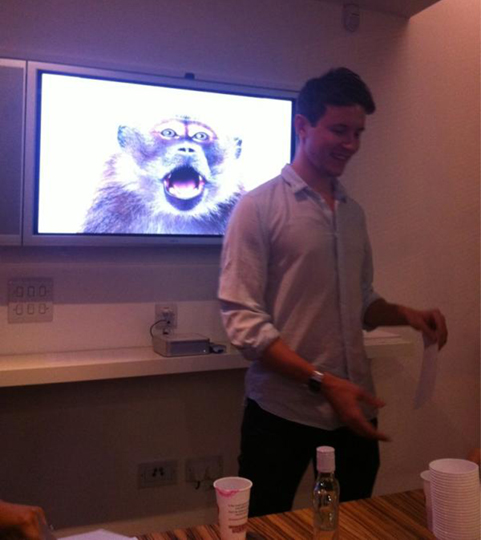
Thursday the 22nd December saw us undertake the fourth of our monthly ‘Interesting talks’, in which under the lure of free pizza, beer and wine, a member of the team gives a small presentation about something that they find interesting!
It was my turn to give the talk this time, and here’s a little summary of how it went:
This presentation turned out to be quite a tricky one due to it’s timing; immediately before our Christmas party and the break up for Christmas, meaning most of the Propaganda team we’re on wind-down, and some we’re already under the influence of a few festive beers and therefore a little bit rowdy (not mentioning any names ‘ahem’ Mr Horberry).
I’d kind of anticipated that this would be the case, and decided to make this presentation a little bit interactive, and not too serious. So it took the form of 3 simple challenges, followed by a group brainstorm session. And in the party spirit it would be fueled by alcohol, so anyone under performing in the challenges would be forced to down a drink.
The theme for the talk was ideas, exploring how we can encourage them, and how we may unknowingly, be hindering them.
Robert McKim
I briefly talked about 1960’s creativity researcher Bob McKim, who’s theories on brainstorming and idea generation influenced the forthcoming challenges. McKim theorised that as adults we have a habit of what he called ‘self-editing’, apparently many adults put up mental barriers that prevent us from exploring every possibility when generating ideas.
Quite humorously, in 1966 McKim experimented with giving a group of designers drugs (Mescaline, a form of LSD to be exact), and then asking them to generate some ideas. The session turned out to be quite successful, with the designers generating some quite good solutions. McKim theorised that the success was not due to the hallucinogenic properties of the LSD, but due to the drugs allowing them to let their barriers down, and let go of the self-editing restraints that they would have had normally.
He expressed that it’s essential creative people work in an environment where they feel comfortable and relaxed about sharing creative ideas, and I referenced some teams of people that are really good at nurturing this environment to great success: The Family Guy creators, Google, Innocent and Facebook. I also highlighted mantras from Pixar and Picasso that describe how ‘good sense’ can some times get in the way of creativity.
3 Challenges
The challenges consisted of getting the team to draw pictures of each other in 30 seconds, The 30 Circles Test (where the team what asked to fill a sheet of 30 circles with as many drawings as they could in 30 seconds). And finally, The Purdue Creativity Test (where you have to think of as many uses as you can for a single simple object), but for a bit of fun and to highlight the point that there should be no bad ideas when brainstorming, I added the twist of asking the team to generate only bad ideas.
The Brainstorm
We then followed this by having a brainstorm for a live project where each person had to come up with an idea in 15 seconds, and the idea had to be based on a random image, some of which were very random.
And I’m happy to say that it seemed to be a success, everyone came up with an idea, some were good, the others just made us laugh.
Posted by Lee Bennett.